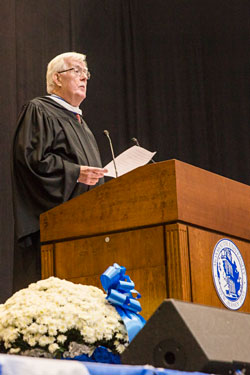New Jersey Gov. Chris Christie has been involved with three scandals that may ruin his chances for a political future on the national stage and change opinions of him around the state of New Jersey.
The scandal that involves the George Washington Bridge or “Bridgegate” as it has been coined was the first scandal in which a traffic study was deemed as political retribution for Fort Lee Mayor, Mark Sokolich, a Democrat, not endorsing Gov. Christie’s re-election bid against Democratic gubernatorial candidate, Barbara Buono.
While Christie has not been directly linked to the scandal, members of his administration have been. His Deputy Chief of Staff, Bridget Kelly, sent an email to the Christie appointed Port Authority executive, David Wildstein, saying, “Time for some traffic problems in Fort Lee.” Wildstein responded, “Got it.” The Governor has denied having any knowledge of the political retribution.
Dr. Christopher DeRosa, an associate professor of history, said, “The fact that his underlings created a massive traffic jam for their own or their boss’s amusement is a difficult one to shake. It is the rare sort of the scandal that unpacks itself and tells you everything you need to know. It doesn’t involve any complex maneuvers or gray areas. From the outline of the story, anyone can grasp the perpetrators’ utter contempt for the ordinary citizen, and see the completely indefensible abuse of power.”
Dr. Michael Phillips-Anderson, an assistant professor of communication, said regarding the bridge scandal, “The George Washington bridge scandal presents a larger problem that the Hoboken issue. It is an understandable story and he has not framed his defense around being upset that his staff thought closing the bridge was a good idea; he’s upset that they lied to him. People don’t like politicians who make everything about them.”
The second scandal involved Gov. Christie and Superstorm Sandy funding for advertisements regarding the re-opening of the Jersey Shore. The $25 million was used for multiple advertisements that showcased the Governor and his family enjoying the re-opened Jersey Shore. Normally this wouldn’t have been a problem but because of its proximity to his re-election campaign, some question whether the Governor used the funds illegally in order to have free political advertising.
The third scandal involves the charges made by Hoboken Mayor, Dawn Zimmer that the Governor and his staff may have held Sandy related aid funds unless Zimmer went along with a real estate project.
State Assemblyman Declan O’Scanlon (R-13) said in a press release, “My district was one of the hardest hit in the state…Now, over a year later we are still digging out from the rubble, folks here in Monmouth continue to need help and every dollar is critical to our recovery.”
O’Scanlon continued, “Personally I think Mayor Zimmer’s credibility has been crushed with this accusation. Why did she wait so long to come forward with this claim? It seems all too convenient that she started talking on the heels of the recent media feeding frenzy attacking Governor Christie. This is nothing more than a political game of pile-on.”
Despite the scandals the Governor has been dealing with, his poll numbers did not drop a substantial amount according to a Monmouth University/Asbury Park Press poll released on Jan. 13, 2014. According to the poll, “Gov. Christie’s job rating currently stands at 59 percent approve to 32 percent disapprove among New Jersey residents and 58 percent to 35 percent among registered voters. His job approval stood at 65 percent approve just one month ago.” This is the first time since Superstorm Sandy that the Governor’s approval rating has been below 60 percent.
Patrick Murray, Director of the Monmouth University Polling, said that the Gov. may be given the benefit of the doubt with New Jersey voters regarding Bridgegate. “They didn’t really think he had come clean about what he knew about his staff’s involvement after the fact, but they don’t think he was directly involved. That is forgivable. Mayor Zimmer’s charges, though, change that equation. While there is no proof to date, the allegations directly link the Governor to a more serious charge than simple political retaliation,” said Murray.
Murray continued, “Up until this weekend’s news from Hoboken, Gov. Christie was still the national Republican party establishment’s choice for 2016. They haven’t abandoned him, but they are anxious to see how he weathers this expanding set of allegations.”
Phillips-Anderson said that Christie may not be in trouble as far as a political future is concerned. “It all depends on how he handles it [the scandals]. If he does not face impeachment or a major decline in approval ratings, it could be an important learning experience for the Governor’s run for the White House. He will need to assemble a team with people outside of New Jersey who know how to run a national campaign,” said Phillips-Anderson.
DeRosa said that the people of New Jersey should remember that there have been political comebacks despite scandals. “Political history is littered with seemingly forever-disgraced officials who manage to make comebacks. If you do not want to see the underlings who took the fall in this episode creep back into positions of public responsibility when nobody is paying attention, it would be helpful to remember their names: David Wildstein, Bill Baroni, and Bridget Anne Kelly, so far,” said DeRosa.
Daniel Roman, a junior political science major said he sees similarities between the scandals that have arisen. “It’s a perfect example of how he bullies state officials and tries to show that he is the boss. I think that people always believed these kind of retributive politics happened behind closed doors, but are sad to see it when it really comes out. Especially from Gov. Christie who is believed to be ‘above’ that and someone people like because he tells the truth and goes against the grain for politicians. But unfortunately these scandals show hubris and abuse of power from our state’s executive,” said Roman.


